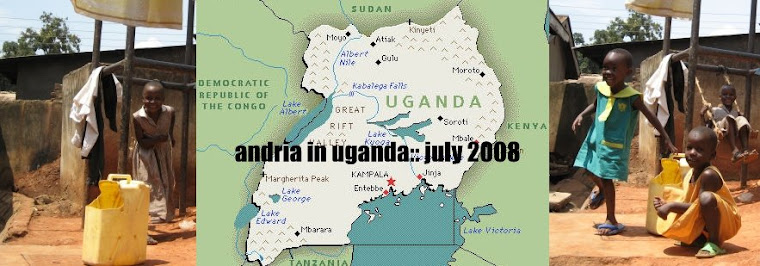
Together, we take a taxi only 5 minutes or so, and we feel like we're in a different world when we get out. The streets are so narrow, we can't drive up to the centre's gate. It's dirty, crowded and Milton guides us through back alleys till we arrive at the home. He explains to us that eighteen boys technically live here - meaning they come home each night to sleep there - but that several others drop in and out each day. Currently two of the boys are in school, but that's all he can afford right now. He says he wants to bring in more kids, but that he has no room and no money to pay for a bigger space.


Once we all duck through the small gate you can see in the picture above, we get a glimpse of the centre. It's small and filthy: three main concrete rooms for the boys. The first is full of benches and has a small chalk board on the wall; the second is almost completely bare; the last is empty also save for a few tattered mattresses strewn out on the floor. This is where the boys sleep each night. Eighteen boys, on six or seven old and mildewed single foam mattresses. We are horrified, and this is not lost on Milton. He tells us to feel free to take photos, and we do, feeling like jackasses the whole time. We probably all have lumps in our throats by this time. I do, anyways. I knew we'd being seeing some hard things, some extreme poverty, but as soon as it's in front of me, I realize I'm not prepared for this.

There's also a small office for Milton, an even smaller kitchen where Betty, a nice woman whom the boys call their aunt, cooks the one meal per day the Centre can afford to provide the boys. Behind the centre, there is a small outhouse, and a tap. There is no shower, which we could have guessed from the stench of body odour that we notice as soon as we set foot in the place.
Milton herds us into the main room where many pairs of eyes give us the once over. He explains to the boys that they are very lucky to have some visitors. Who knows what these kids are thinking. Milton wants us to get to know the kids, to hear their stories and get a chance to ask questions.
He sets the five of us up in his little office and has each of the boys come in, one by one, to spend a few minutes with us. Amy, Eric, Jigna, Jenn and I ask questions that they answer, about who they are, how long they spent on the streets and how they ended up there, how they came to be living here... It feels like a very awkward panel interview and we do our best to make it less awkward. We don't know yet what we should be doing with the boys, anyway, and we are eager to learn about them.
As the boys talk, we notice their stories starting to repeat themselves. A mother dies and a father remarries. The new stepmother has too many kids of her own, and mistreats the new husband's boy till he runs away. Or the stepmother practices witchcraft, and kicks the boy out, convinced he is evil. Or the boy is accused of something, and forced out. Or both parents die of AIDS, leaving the children to fend for themselves. Sometimes the boys are less than ten years old when they find themselves on the streets. On the streets, they are beaten up, chased away, mocked, and ignored. They are assumed to be criminals. It is dangerous, they tell us, to simply be a street kid. They avoid eye contact with us as they talk, and their voices are steady, unemotional. This is life for them. It is simply how it is.
These boys are incredible - despite all they've been through, they still smile wide as they tell us their dreams. They want to become professional pilots, mechanics, engineers. They want to go to school. We ask them what questions they have for us, imagining that they'll want to know what we studied in school, how we know each other, what our company does, what North America is like. They don't care about that though. One by one, each boy asks us the same one thing: what are we going to do to help them? And we don't yet know the answer to that.





No comments:
Post a Comment